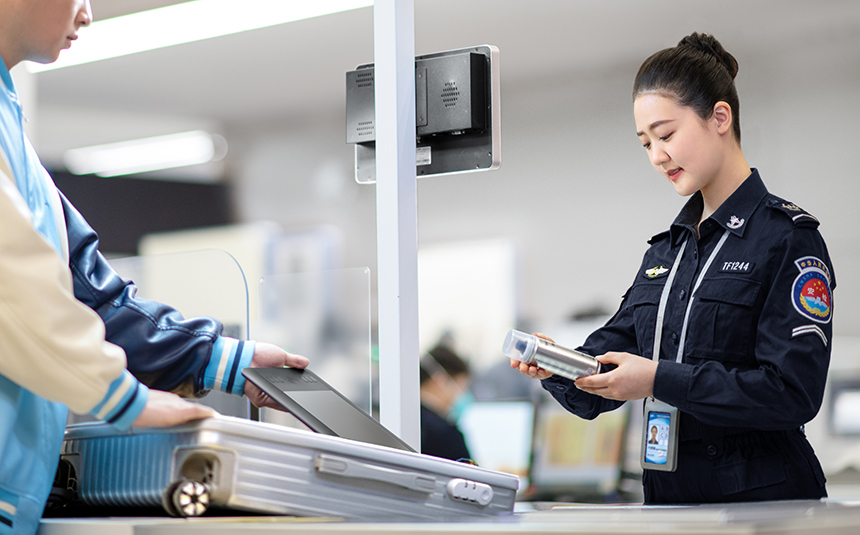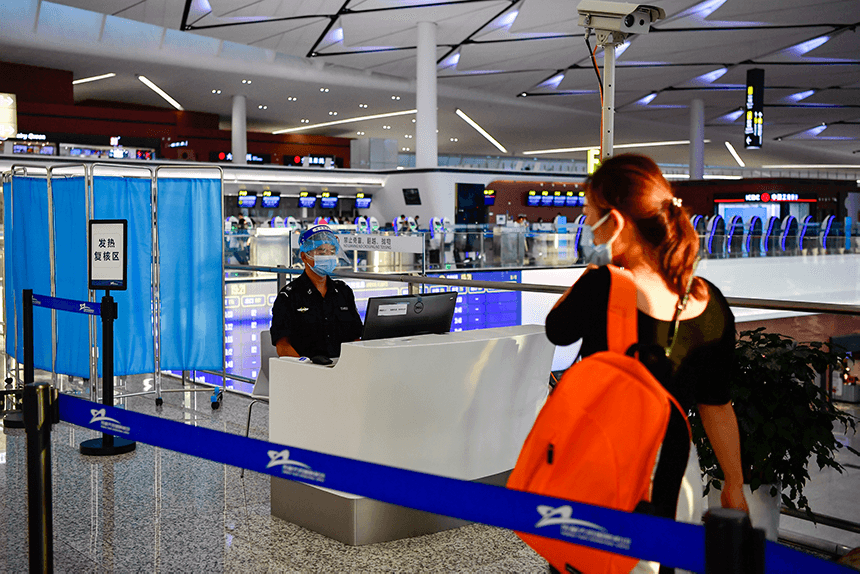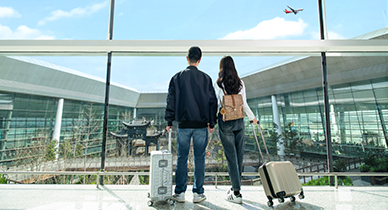Security Check Instructions
Provisions on Valid ID Certificates for Domestic Flights
In accordance with relevant regulations of the Civil Aviation Administration of China, valid ID certificates and boarding credentials are required for domestic flights. Types of valid ID certificates are as follow:
1. Chinese mainland residents
(1) Chinese mainland ID card; temporary ID card; passport; seafarer's passport.
(2) Valid certificates for Chinese mainland residents under 16 also include: medical certificate of birth, household registration permit, student's ID card, or other identity certificate issued by the household registered public security bureau.
(3) For Chinese citizens whose valid boarding credentials for domestic flights are lost, expired, damaged or unable to be presented for some reason, they can take the flight with the following documents or certificates:
A. The Temporary Identity Certificate or Certificate of Household Registration issued by public security bureau with a recent certificate photo, special seal and validity period.
B. The Receipt of ID Card Application issued by public security bureau with a recent certificate photo, special seal for household registration and validity period during the period when passengers apply for ID cards.
C. The Temporary Identity Certificate for Civil Aviation Transportation or its electronic version with a recent certificate photo and validity period issued by civil airport public security bureau.
2. Public security and military personnel
Military officer certificate; military civilian cadre certificate; compulsory servicemen certificate; soldier certificate; military civilian staff certificate; military staff card; armed police officer certificate; armed police certificate.
3. Residents of Hong Kong, Macao and Taiwan Mainland travel permit for Hong Kong and Macao residents; mainland travel permit for Taiwan residents; residence permit for Hong Kong, Macao and Taiwan residents.
4. Foreign personnel
(1) Passport; foreign permanent resident ID card; diplomatic personnel certificate, administrative and technical personnel certificate, personnel certificate of international organizations, residence permit issued by the Ministry of Foreign Affairs in China; travel permit.
(2) The Passport Loss Certificate or Acceptance Receipt of Foreigner's Visa Application with a recent certificate photo and validity period issued by the exit-entry administration department of public security bureau for overseas passengers (foreign passengers, passengers of Hong Kong, Macao, or Taiwan) who lost valid ID certificates or cannot provide valid certificates due to delayed application.
5. Other valid identity certificates accepted by the Civil Aviation Administration of China
6. Valid identity certificates used for check-in and security check procedures should be the same
List of Banned Items in Hand and Checked Luggage
I. Guns and other weapons (including major parts and components)
Devices that can fire ammo (including pills and other objects) or may cause serious injuries, or items that can be mistakenly regarded as such devices, including:
(I) Military guns and guns for official duties, such as pistols, rifles, submachine guns, machine guns, anti-riot guns;
(II) Civilian guns, such as air guns, shotguns, sport guns, tranquilizer guns;
(III) Other types of firearms, such as prop guns, starting guns, ball guns, guns from overseas and all types of illegally-manufactured guns;
(IV) Imitation products of the above items.
II. Explosive or inflammable substances and devices
Explosive or inflammable devices (substances) that can cause severe injuries or pose danger to the aircraft, or items that can be mistakenly regarded as such devices (substances), including:
(I) Ammunition, such as bombs, grenades, flares, napalm bombs, smoke bombs, signal rockets, tear shells, gas bombs, bullets (including plumbs, blank ammunition, training bullets);
(II) Explosive materials, such as dynamites, detonators, fuses, initiators, blasting fuses, detonating fuses, blasting agents;
(III) Pyrotechnic objects, such as fireworks and crackers, smoke pads, yellow smoke, firework bombshell;
(IV) Imitation products of the above items.
III. Controlled instruments
Controlled instruments that can cause personal injuries or endanger aviation safety and transportation order, including:
(I) Controlled knives, such as daggers (single-edged, double-edged or multi-edged knife with a sharp point, handle, pommel and fuller, blade angle <60 degree), triangular scrapper (knife for machining with three blades), flick knife with self-locking device (the extended for flicked blade can be fixed by the spring or lock in the handle), other similar single-edged, double-edged or triangular sharp knives (single-edged, double-edged or multi-edged knives longer than 150 mm with blade angle <60 degree) and single-edged, double-edged or multi-edged knives longer than 220 mm with blade angle >60 degree;
(II) Military and police gear, such as clubs, police shock machine, military or police daggers, handcuffs, thumb-cuffs, shackles, tear injectors;
(3) Other controlled instruments stipulated by the national regulations, such as crossbow.
IV. Hazardous articles
Hazardous articles that can cause personal injuries or pose danger to aviation safety and transportation order, including:
(I) Compressed or liquefied gas, such as hydrogen, methane, ethane, buthane, natural gas, ethylene, propylene, acetylene (dissolved in medium), carbon monoxide, LPG, freon, oxygen, carbon dioxide, water gas, lighter fuel and liquefied gas for lighter;
(II) Spontaneous combustible articles, such as yellow phosphorus, white phosphorus, nitrocellulose (including film rolls), oiled paper and related products;
(III) Articles that are highly inflammable when wet by water, such as potassium, sodium, lithium, calcium carbide, magnesium aluminum powder;
(IV) Inflammable liquid, such as petrol, kerosene, diesel, benzene, ethanol (alcohol), acetone, diethyl ether, oil paint, thinner, retinol and products with inflammable solvent;
(V) Inflammable solid, including red phosphorus, flashlight powder, solidified alcohol, celluloid, foaming agent;
(VI) Oxidizing agent and organic peroxides, such as potassium permanganate, potassium chlorate, sodium peroxide, potassium peroxide, lead peroxide, peracetic acid, hydrogen peroxide;
(VII) Toxic articles, such as cyanide, arsenic, highly toxic pesticide and other highly toxic chemicals;
(VIII) Erosive articles, such as sulfuric acid, hydrochloric acid, nitric acid, sodium hydroxide, potassium hydroxide, mercury;
(IX) Radioactive substances, such as radioactive isotopes, etc.
V. Other substances
Substances that can cause personal injuries or endanger aviation safety and transportation order, including:
(I) Pathogen of contagions, such as HBV, bacillus anthracis, mycobacterium tuberculosis, HIV;
(II) Kindling materials (including ignition devices), such as lighter, match, cigar lighter, magnesium anode (flintstone);
(III) Power bank and lithium battery with rated energy larger than 160 WH (lithium battery powered electric wheelchairs are otherwise specified);
(IV) Alcoholic beverage with more than 70% alcohol;
(V) Items with strong magnetization, strong pungent smell, or items prone to panicking passengers, and items with unknown nature that may be dangerous.
(VI) Other articles prohibited from being carried or transported as stipulated by national laws, administrative regulations and rules.
List of Restricted Items in Hand and Checked Luggage
I. Items that are banned in hand luggage but are allowed in checked luggage
(I) Sharp instruments
Instruments with sharp edges or points, and made of metal or other materials hard enough to cause serious personal injuries, mainly including:
1. Daily use knives (with the blade length of more than 6 cm), such as kitchen knives, fruit knives, scissors, art knives and paper cutters;
2. Professional use cutters (with unlimited blade length), such as scalpels, butcher knives, carving knives, planers, milling cutters;
3. Swords, spears, swords and halberds used for martial arts performance.
(II) Blunt instruments
Items without edges or sharp points, and made of metal or other materials with enough strength to cause serious personal injury, mainly including: sticks (including telescopic bars and nunchakus), clubs, billiards clubs, cricket rackets, hockey clubs, golf clubs, alpenstocks, ski poles, knuckle-dusters (hand stitches);
(III) Others
Other items that can cause injuries or pose great harms to aviation safety and transportation order, including:
1. Tools, such as drill machines (including bits), chisel, cones, saws, bolt guns, nail guns, screwdrivers, crowbars, hammers, pliers, welding guns, wrench, axes, hatchet, vernier caliper, ice picks, ice cones;
2. Other items, such as dart, slingshots, bows, arrows and buzzers self-defense devices; electric shock devices, Mace gas, tear gas, pepper spray, acid spray and animal removing spray not controlled by the state.
II. List of restricted items in hand and checked luggage
(I) Items that are conditionally allowed in hand luggage but unconditionally allowed in checked luggage
1. For international and regional flights, liquid items carried in hand luggage must be in a container of no more than 100 ml and the container must be in a single, transparent, re-sealable plastic bag with a volume of less than 1 L. Only one transparent plastic bag is allowed for each passenger, and those beyond this limit should be put in the checked luggage;
2. For domestic flights, liquid items are not allowed in hand luggage (except cosmetics, toothpastes and shaving cream for private use during the air travel). Cosmetics for private use during the air travel in hand luggage must meet the following three requirements (only one for each type, carried in a container of no more than 100 mL, and subject to bottle-open check); for toothpastes and shaving cream, only one for each type, carried in a container of no more than 100g (mL). Duty-free liquid items carried in hand luggage of passengers transferring from international and regional flights to domestic flights within the same security restricted area must meet the following three requirements (with receipt or invoice, put in a transparent, sealed and intact plastic bag, subject to security check). If the passenger leaves the security restricted area when transferring to a domestic flight, the duty-free liquid items must be put in checked luggage;
3. Necessary liquid dairy products for infants and patients with diabetes or other diseases during air travel can be carried in hand luggage only after inspection;
4. The liquid items purchased or obtained by passengers in the airport control area or aircraft can be carried with them before leaving the airport control area;
(II) Items that are banned in hand luggage but are conditionally allowed in checked luggage
Alcoholic beverages are prohibited to be carried in hand luggage, but can be consigned as luggage with the following restrictions:
1. It shall be well and clearly identified and placed in the retail container which shall not exceed 5 L in volume each;
2. When the content of alcohol is less than or equal to 24%, the quantity will not be limited;
3. When the content of alcohol is more than 24%, less than or equal to 70%, the quantity shall not exceed 5 L.
(III) Items that are banned in checked luggage but are conditionally allowed in hand luggage
Power banks and lithium batteries are prohibited to be consigned as luggage and are subject to the following restrictions when carried with passengers (excluding the lithium batteries for electric wheelchairs):
1. With intact and clear label and rated energy no more than 100 Wh;
2. Batteries with rated energy more than 100 Wh and no more than 160 Wh must be approved by the airlines. Each passenger can carry no more than two such batteries.
III. Other articles restricted from transportation as stipulated by national laws, administrative regulations and rules.

Instructions for Boarding Time
Currently, the check-in deadline for domestic flights at Chengdu Tianfu International Airport is 45 minutes before scheduled departure (Note: the check-in deadline at check-in areas J and K at GTC and check-in area M at Joyhub Air Hotel and Joyhub Cheer Hotel is 60 minutes before scheduled departure); in terms of the check-in deadline for international/Hong Kong/Macau/Taiwan flights, please consult the airline carrier.
Broadcast Tips
To create a quiet and comfortable environment, Chengdu Tianfu International Airport implements the Subarea Announcement system. To avoid missing the important announcement, please wait around your boarding gate area and listen carefully to the announcement. Thank you for your cooperation.
Instructions for Customs
I. Instructions for customs declaration of articles
(I) Entry-exit personnel carrying the following articles shall declare to the customs and receive quarantine inspection:
1. Entry animals and plants, animal and plant products and other quarantine objects;
2. Entry-exit biological species resources, endangered wild animals and plants and their products;
3. Exit wild animals and plants and their products under national key protection;
4. Entry-exit special articles such as microorganisms, human tissues, biological products, blood and blood products;
5. Entry-exit corpses and skeletons;
6. Entry-exit baggage and articles from epidemic areas, contaminated by infectious diseases or possibly spreading infectious diseases;
7. Other belongings that should be declared to the customs and subject to quarantine inspection.
(II) If an entry passenger carries the following articles, he/she shall truthfully fill in the corresponding columns of the Customs Declaration Form for Exit-Entry Passengers' Baggage and Articles of the People's Republic of China (hereinafter referred to as the Declaration Form), and submit the relevant articles to the customs for verification and go through relevant formalities:
1. Animals, plants and their products, microorganisms, biological products, human tissues, blood and their products;
2. Personal articles with a total value exceeding RMB 5,000 (including RMB 5,000, the same below) that resident passengers obtain abroad;
3. Articles with a total value of more than RMB 2,000 to be left in China by non-resident passengers;
4. More than 1,500 ml of alcoholic beverages (with an alcohol content of more than 12 degrees), more than 400 cigarettes, more than 100 cigars, or more than 500 grams of cut tobacco;
5. Cash exceeding RMB 20,000, or foreign cash equivalent to more than USD 5,000;
6. Separate transportation of luggage, goods, samples and advertising products;
7. Other articles that need to be declared to the customs.
(III) If an exit passenger carries the following articles, he/she shall truthfully fill them in the corresponding columns of the Declaration Form, submit the relevant articles to the customs for verification and go through relevant formalities:
1. Cultural relics, endangered animals and plants and their products, biological species resources, gold and silver and other precious metals;
2. Personal travel articles that resident passengers need to bring, such as cameras, video cameras and laptops with a unit price exceeding RMB 5,000;
3. Cash exceeding RMB 20,000, or foreign cash equivalent to more than USD 5,000;
4. Goods, samples and advertising products;
5. Other articles that need to be declared to the customs.
II. Instructions for customs regulations on carrying embargoed articles
(I) According to the Administrative Measures for Quarantine of Articles Carried by Entry-Exit Personnel (Order No.146 of formerly Inspection and Quarantine of the People's Republic of China), the following articles are prohibited from entry:
1. Animal and plant pathogens (including strains, virus species, etc.), injurious insects and other pests;
2. Relevant animals and plants, animal and plant products and other quarantine objects in countries or regions where animal and plant epidemics are prevalent;
3. Carcasses;
4. Soil;
5. Articles listed in the Catalogue of Animals and Plants, and Animal and Plant Products Prohibited from being Carried or Posted into the People's Republic of China;
6. Waste articles, radioactive substances and other articles prohibited from entry as stipulated by the state.
(II) According to the List of the People's Republic of China of Articles Prohibited from Import and Export, the following articles are prohibited from import:
1. All kinds of weapons, simulated weapons, ammunition and explosives;
2. Counterfeit currency and counterfeit securities;
3. Printed materials, films, photographs, records, films, audio and video tapes, laser discs, computer storage media and other articles harmful to Chinese politics, economy, culture and morality;
4. All kinds of strong poisons;
5. Opium, morphine, heroin, marijuana and other addictive narcotics and psychotropic substances;
6. Animals, plants and their products with dangerous germs, pests and other harmful organisms;
7. Food, medicine or other articles that are harmful to human and animal health, come from epidemic areas and can spread diseases.
(III) According to the List of the People's Republic of China of Articles Prohibited from Import and Export, the following articles are prohibited from export:
1. All articles included in the prohibited entry scope;
2. Manuscripts, printed materials, films, photographs, records, films, audio and video tapes, laser discs, computer storage media and other articles involving state secrets;
3. Precious cultural relics and other styles prohibited from export;
4. Endangered and precious animals and plants (including specimens) and their seeds and propagation materials.
(IV) According to the List of the People's Republic of China of Articles Restricted from Import and Export, the following articles are restricted from import:
1. Radio transceivers and communication security machines;
2. Tobacco and alcohol;
3. Endangered and precious animals and plants (including specimens) and their seeds and propagation materials;
4. National currency;
5. Other articles restricted from import by the customs.
(V) According to the List of the People's Republic of China of Articles Restricted from Import and Export, the following articles are restricted from export:
1. Precious metals such as gold and silver and their products;
2. National currency;
3. Foreign currency and its securities;
4. Radio transceivers and communication security machines;
5. Valuable Chinese herbal medicines;
6. General cultural relics;
7. Other articles restricted from export by the customs.
(VI) Catalogue of Animals and Plants, and Animal and Plant Products Prohibited from being Carried or Posted into the People's Republic of China [1]:
1. Types of animals and animal products
(1) Live animals (except dogs and cats [2]), including all mammals, birds, fish, amphibians, reptiles, insects and other invertebrates, animal genetic materials.
(2) (Raw or cooked) meat (including internal organs) and its products; aquatic animal products.
(3) Animal-derived milk and dairy products, including raw milk, fresh milk, yogurt, animal-derived cream, butter, cheese and other dairy products.
(4) Eggs and their products, including fresh eggs, preserved eggs, salted eggs, egg liquid, eggshells, mayonnaise and other egg-derived products.
(5) Bird's nest (except canned bird's nest).
(6) Oils, skins, hairs, hoofs, bones, horns and their products.
(7) Animal-derived feed (including meat powder, bone meal, fish meal, whey powder, blood meal and other single feeds), animal-derived Chinese herbal medicines and animal-derived fertilizers.
2. Types of plants and plant products
(8) Fresh fruits and vegetables.
(9) Tobacco leaves (excluding cut tobacco).
(10) Seeds (seedlings), nursery-grown plants and other plant materials with reproductive ability.
(11) Organic culture medium.
3. Other categories
(12) Biological materials such as animal and plant pathogens including strains and viruses, pests and other harmful organisms, cells, organs and tissues, blood and its products.
(13) Carcasses, animal specimens and animal-derived wastes.
(14) Soil.
(15) Genetically modified biological materials.
(16) Other animals and plants, animal and plant products and other quarantine objects prohibited by the state from entry.
Note: [1] Animals and plants, their products and other quarantine objects carried or posted into China are not restricted by the Catalogue if they are approved by the relevant administrative departments of the state and have quarantine certificates issued by official institutions of the exporting countries or regions.
[2] Dogs, cats and other pets with animal quarantine certificates and vaccination certificates issued by official institutions of exporting countries or regions are limited to one pet per person.
III. Instructions for customs departure tax refund regulations
(I) If overseas passengers (foreigners and compatriots from Hong Kong, Macao and Taiwan who have lived continuously in China for no more than 183 days) need to refund tax for their purchased goods when leaving the country, they shall take the initiative to declare to the customs, and submit the tax refund goods, the application form for tax refund for overseas passengers' shopping departure (hereinafter referred to as the application form), the sales invoice of tax refund goods and their valid identity documents.
(II) If the tax refund articles submitted by the passengers are consistent with those listed in the application form after verification by the customs, the customs shall confirm and sign the application form and hand it over to the passengers for tax refund formalities; If the quantity of articles submitted by passengers does not match the quantity listed in the application form, the customs shall confirm and sign the quantity of articles submitted for inspection, and hand them over to the passengers for tax refund formalities.
(III) Under any of the following circumstances, the customs shall not go through the formalities of signing and sealing the tax refund for overseas passengers' shopping departure:
1. The names of the articles submitted by outbound passengers are inconsistent with the articles listed in the application form;
2. The information of shoppers listed in the application form is inconsistent with the information of outbound passengers;
3. Others that do not meet the departure tax refund regulations.
(IV) The special places for handling departure tax refund business belong to the places under the supervision of the customs, and the standards for setting up relevant places shall meet the supervision requirements of the customs.
(V) The tax refund articles shall be subject to the supervision of the customs after being verified by the customs and before actually leaving the country.
(VI) The list of ports for implementing departure tax refund business and the implementation date shall be subject to the release of the Ministry of Finance, the General Administration of Customs and the State Taxation Administration.
(VII) Tax refund articles refer to personal belongings purchased by overseas passengers at tax refund shops and meeting the tax refund conditions, but do not include the following items:
1. Articles prohibited or restricted from leaving the country listed in the List of Prohibited or Restricted Articles from Entry and Exit of the People's Republic of China;
2. Articles sold by tax refund shops that are subject to VAT exemption policy;
3. Other articles prescribed by the Ministry of Finance, the General Administration of Customs and the State Taxation Administration.
Click the official website http://www.customs.gov.cn/ of the General Administration of Customs of the People's Republic of China for details.
Instructions for Border Inspection
If you need to know the relevant laws and regulations on entry and exit and the latest entry-exit policies, please visit the official website of the National Immigration Administration (www.nia.gov.cn) or pay attention to the WeChat official account of the National Immigration Administration.
Entry-exit policy consulting (complaint/suggestion) hotline: 028-12367.
About Ticket
About Tickets
Instructions for Port Visas
(1) Application conditions:
A. According to the Exit-Entry Administration Law of the People's Republic of China and relevant regulations, foreigners who need to enter China urgently for humanitarian reasons, are invited to enter the country for emergency business, engineering emergency repair or have other urgent entry needs, and hold the certification materials that the relevant competent departments agree to apply for visas at ports; Foreign tourist groups invited by approved travel agencies with corresponding qualifications can apply for port visas;
B Foreign high-level talents can directly apply for port visas with relevant certification materials.
(2) Ways of application:
A. When an individual applies for a port visa, he/she shall apply to the port visa authority when arriving at the port;
B. When a tourist group applies for port visas, the travel agency invited by the organization shall apply to the port visa authority;
C. Inviting units (individuals) may apply to the local port visa authorities on behalf of foreigners before they arrive at the port;
D. Applications submitted on behalf of foreigners to non-local port visa authorities may be forwarded through the exit-entry administration agencies of local public security organs at or above the prefecture level.
(3) Place of application: T1 International Arrival
Distribution of Check-in Area


Epidemic Prevention and Control Notice

1. In order to strictly implement the latest epidemic prevention and control requirements at national, provincial and municipal level, Tianfu International Airport has set up epidemic prevention and control checkpoints at all entrances and exits. All passengers entering and leaving the terminal are requested to cooperate with anti-epidemic inspection, present the Health Code, scan the Venue QR Code and undergo temperature monitoring. Passengers entering the Tianfu International Airport terminal should keep wearing a mask properly.
2. Due to changes of epidemic situation and medium and high-risk areas, local policies related to epidemic prevention and control may be adjusted at any time according to the actual situation. It is recommended that you contact the airline you are traveling with and the epidemic prevention and control authorities at the origin and destination in advance to understand the latest local epidemic control requirements before departure to avoid any delay.
3. If you have a body temperature above 37.3℃, respiratory symptoms or other physical symptoms within the airport area, please contact the airport medical staff promptly at 028-86909120.

 HotLine
HotLine












 Sichuan Public Network Security 51017302000003
Sichuan Public Network Security 51017302000003